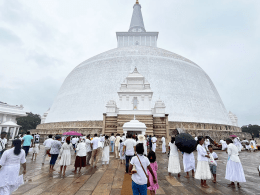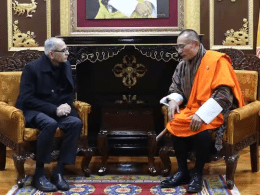In a world increasingly driven by technology and rapid change, a group of monks, scholars, and students gathered at the Paro College of Education yesterday to reflect on a timeless question: how can Buddhism remain relevant in today’s fast-paced, interconnected world?
The seminar, titled “Buddhism and Its Relevance to Current Global Challenges and Opportunities,” brought together participants from across Bhutan to explore the intersection between spirituality and modern life. Far from viewing technological advancement as a threat, speakers at the event emphasized its potential as a bridge for spreading Buddhist values and promoting mindful living.
“The seminar explored how we can apply the values of Buddhism in development, in our daily lives, and even in maintaining our mental well-being,” said Cheki Jungney, one of the speakers. “I’m truly glad to have had the opportunity to take part in it.”
Harnessing Digital Tools for Dharma
Several speakers highlighted how digital technology—often blamed for distraction and disconnection—could instead serve as a medium for awareness and compassion. Social media, online learning platforms, and mobile apps, they said, could become tools for sharing teachings, facilitating discussions, and preserving sacred knowledge.
“Today, we have all these digital tools that occupy much of our attention,” said Tshering Dorji, another speaker. “Instead of seeing them as distractions, we can use them as bridges to learn about Buddhism. That’s how we bring timeless values into our modern lives.”
Preserving Dzongkha and Buddhist Wisdom
Beyond technology, the seminar also underscored the deep link between Buddhism and the Dzongkha language. Organisers expressed concern about the declining use of Dzongkha among younger generations and stressed that promoting Buddhist teachings in the national language plays a vital role in cultural preservation.
“Even when we talk about Buddhism, it ultimately connects to the Dzongkha language,” said Tshering Penjor, a lecturer at Paro College of Education. “By engaging Dzongkha students in such seminars, we help prepare future teachers who will keep both the language and the wisdom it carries alive.”
The event, he added, serves as both a spiritual and educational platform—encouraging mindfulness while strengthening Bhutan’s linguistic and cultural heritage.
Looking Ahead
Organisers plan to hold more such seminars in the future, aiming to provide students and educators with opportunities to integrate Buddhist teachings into modern education and community life. As Bhutan continues to balance progress with tradition, gatherings like these highlight the country’s ongoing commitment to harmony between the spiritual and the modern.








